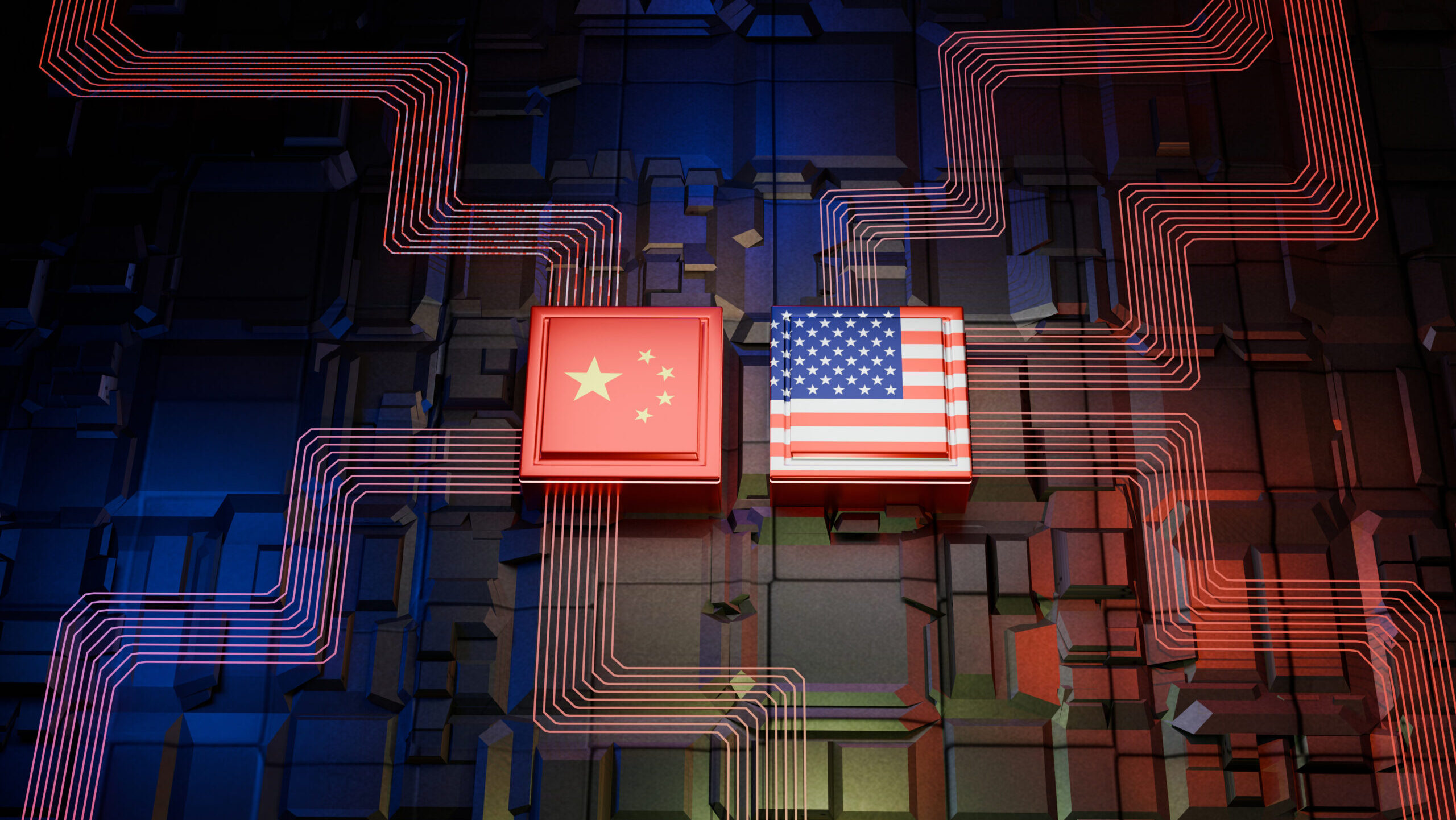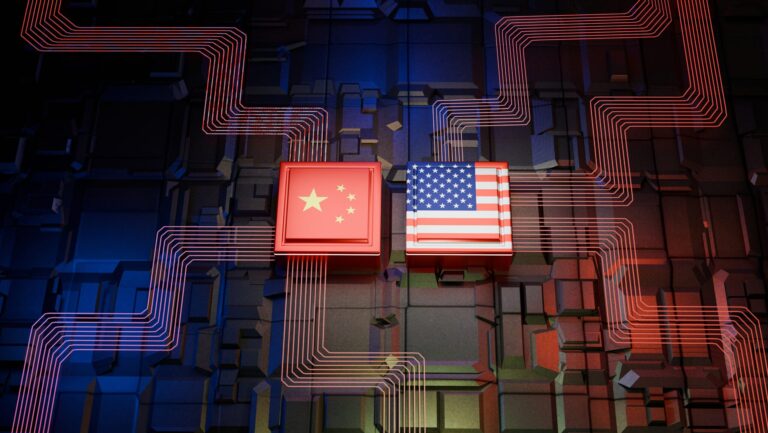Networks and Digital Warfare

The US and China are in a technological arms race, but who is on the best path forward? (Wong Yu Liang/Getty Images)
WASHINGTON — With Beijing investing heavily in artificial intelligence and other high-tech tools of so-called “informationized” warfare, a worried Washington wants to ride the wave of innovation in AI, software and other cutting-edge technologies. But the governments of the rival superpowers have very different relationships with their respective tech sectors. So how can the U.S. gain an advantage?
“China is building more ships and more planes. [but] “The United States dominates technological innovation,” Gen. James Rainey, commander of Army Futures Command, said at a recent Ash Carter Exchange. “The best companies in the world are entirely American companies, and as long as they’re coming with us on this journey, I’m pretty happy.”
But how can East Coast bureaucrats bring in West Coast startups? China’s official policy of “military-civil integration” — which effectively puts Chinese tech companies in the service of the nation — and state-led AI investments have long raised concerns at the top, leading critics, veterans and even top military officials to call for a government-led effort akin to building an atomic bomb.
“The idea of a Manhattan Project has come up a few times today,” said Enrique Otti, a retired Air Force colonel and chief technology officer at Second Front Systems, who moderated a panel of technology experts at Second Front’s Offset Symposium conference. “What are the current challenges that remain unsolved? Do you believe we need a Manhattan Project, primarily to maintain a competitive advantage over China?”
“I don’t think the country really needs another Manhattan Project,” Katie Sutton, chief technical adviser to U.S. Cyber Command, responded.[That] It was a single, very focused technology that was needed in a specific timeline… I think the challenge we’re going to struggle with going forward, especially on the national security side, is the number of new technologies that are coming at us.”
Just ask Maynard Holliday, who helped found the Defense Innovation Unit, the Pentagon’s Silicon Valley outreach office, and now oversees 11 officially designated “critical technology areas” ranging from AI to 5G for the Pentagon’s research and engineering arm. Holliday said at the DefenseTalks 2024 conference last week that he spends a lot of his time and energy reaching out to promising innovators.
“Part of my job — and honestly, my favorite part of the job — is going out and identifying new technologies that are being developed by non-traditional industry players,” he said.
“I spent the last two weeks of April back home in the Bay Area and on the West Coast,” Holliday said, visiting companies including Hadrian Automation in Torrance, which uses AI to run precision manufacturing machines; Divergent, also in Torrance, which is expanding from the automotive industry into unmanned systems; and Relativity Space in Long Beach, which launched the world’s first 3D-printed rocket.
The amount of innovation may seem overwhelming, but America’s free market is well suited to solving it, argues Nand Mulchandani, the CIA’s first chief technology officer and former chief technology officer for the Defense Department’s Joint AI Center.
“In this country, we have very specific conditions and calculations for the system to work,” Mulchandani told the Ash Carter Conference. “For every company like Facebook, there are 399 that didn’t make it.”
“Eight out of 10 startups fail,” agreed Corey Jaskolski of RAIC Labs. While many defense reformers blame the Pentagon’s cumbersome procurement process for making it hard for startups to survive, Jaskolski said at the Offset Symposium that “many of the bodies in the Valley of Death were destined to be there anyway.”
Viewed in this light, a high failure rate is akin to the driving force of evolution, natural selection, which ruthlessly sifts through animals until only a handful of the “fittest” individuals survive long enough to reproduce. Another similarity is the classic thought experiment of setting an unlimited number of monkeys to type on a keyboard until one of them randomly generates, say, the script for Hamlet.
“I call it ‘a million monkeys at a typewriter,'” Mulchandani says. “You can’t specifically pick one monkey to write Shakespeare, but the odds are that one of them will.”
American Initiative vs. Beijing’s Bureaucracy
The unpredictable nature of innovation, Mr. Moolchandani argued, is why “a state-led economic model, where bureaucrats decide who wins and who loses, doesn’t work.” Authoritarian regimes like China can mobilize huge amounts of money around proven technologies to become “fast followers,” but it’s much harder to lead, he said.
But is this really how China is run? Do Beijing bureaucrats typically try to pick winners in advance?
“Yes and no,” said Dean Chen, senior adviser to the China Program at the United States Institute of Peace. “This is not a simple command economy.”
“The Chinese market is Best “This is a system that looks at a variety of signals, including demand signals and resource allocation,” Chen wrote in an email exchange with Breaking Defense. teeth Political distortions — for example, steel mills and cement plants stay open because they want to create jobs. Many People — but it’s not a group of wise men. [in the] Selecting Politburo-backed technologies.”
Related: Enhanced Edge vs. the Centralization Trap: Who Can Use AI Better: the U.S. or China?
Indeed, software and AI used to be more independent, market-driven sectors of China’s overall economy, argues Matthew Sheehan, a fellow at the Carnegie Endowment for Economic Cooperation and Development: The early growth of the technology was “very chaotic, very competitive,” with little government control, he says, so much so that Chinese leader Xi Jinping has tried to crack down in recent years.
“The number of Chinese startups is exploding, and strange business models are popping up one after another. [like] “There’s a million monkeys typing,” Sheehan told Breaking Defense. “China didn’t get to where it is today by picking technology winners. [the government] “It’s not like it picked Tencent, Alibaba or Baidu. In fact, it has had fairly tense relationships with those companies for a long time.”
There has been significant government investment, especially in AI, since Beijing declared in 2017 that “China should be the world leader in AI by 2030.” But that hasn’t translated into government control or well-coordinated planning. Rather, Sheehan said, “It sent a signal from the central government to every official across the country: ‘We need to do something, anything, to advance AI.'”
However, between 2020 and 2022, President Xi Jinping Sheehan led a major crackdown on a tech industry that was seen as too independent. It continues to have a chilling effect on investors, and US attempts to “decouple” economically from China will only chill things further, Sheehan said.
In particular, Sheehan said, “US export controls on semiconductors and semiconductor manufacturing equipment have really cornered China… They’re really short on semiconductors.” This has forced the Chinese government to make difficult choices about which companies to support in both semiconductor manufacturing and “cutting-edge” AI development.
That’s true, Chen agreed, but Beijing shouldn’t be underestimated, especially when it comes to military technology. “In China, national security considerations always take precedence over all other considerations,” Chen said. “So when silicon, chips, and spectrum are limited, national security takes precedence.”

